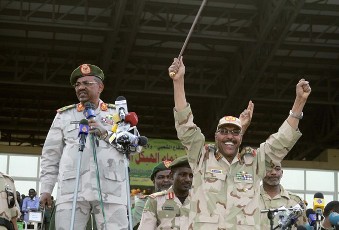Sudanese MP’s demand probe against those responsible for the fall of Heglig
April 16, 2012 (KHARTOUM) – A number of Sudanese lawmakers called for those responsible for the failure to protect the oil-rich region of Heglig from falling at the hands of South Sudan’s army (SPLA) last week be held to account.

MP Samia Habani expressed surprise at the ease by which the area, which produces half of Sudan’s oil, got overrun by South Sudanese forces.
“How can Heglig fall so easily and in a matter of hours? It is a strategic area and if it fell after battles and martyrs [dying] it would have been more acceptable,” Habani said.
“But to be surrendered to them in hours is unacceptable and there must be clear decisions,” she added.
Ali Abrsi, another MP, said that the officials should be scrutinised so that the matter does not degenerate into a more dangerous reality. He recalled how the industry minister resigned last month after an error led to the delay in inaugurating a major sugar facility causing a huge embarrassment to the government.
Last week the parliamentary bloc of the ruling National Congress Party (NCP) held a meeting and vowed to demand that president Omer Hassan al-Bashir remove defense minister Abdel-Rahim Mohamed Hussein.
Many are questioning Bashir’s insistence to keep Hussein despite his repeated poor performance. They note the attack on the capital by Darfur rebels the Justice and Equality Movement (JEM) in 2008 which rattled the army at the time despite quickly repulsing it.
“There is a growing criticism of Abdel-Rahim,” an international analyst told Agence France Presse (AFP), declining to be named.
“To me it’s absolutely absurd that they couldn’t protect their main oilfield… it’s inexcusable” the analyst added.
Al-Tayib Zain Al-Abdeen, a supervisor in the University of Khartoum’s political science department, said the ease with which South Sudan took Heglig “is one of the big questions.”
“They took it just like that,” al-Abdeen said.
Heglig is now at risk of either deliberate or combat-related damage, one foreign diplomat said.
“According to the information that we have, they have positioned their tanks right beside the oil facilities, so if the Sudanese bomb they will also destroy those facilities,” said the diplomat, requesting anonymity.
The diplomat said it will be “very difficult” for Sudan to restart production in Heglig. “So this war will be a more negative impact on the Sudanese economy”, he said.
“If they destroy that, I think Sudan will try to avenge this and may try to also destroy the oilfields in Southern Sudan,” al-Abdeen said.
Sudan downplayed the impact of the Heglig’s fall on its fuel supplies saying that they could last for a year without recapturing the area.
However, the government warned Juba against any attempt to sabotage the oil facilities.
The border war could last weeks, and in the meantime some people have called for the defense minister’s resignation, al-Abdeen said.
“He’s one of the least efficient ministers in the government,” the professor added.
But Hussein is protected by Bashir, who is also wanted by the ICC for alleged crimes in Darfur, the international analyst said.
“So I don’t think very much will happen,” he said.
He and al-Abdeen suggested Sudan’s military may be over-stretched. It was already battling insurgents in South Kordofan State, faces a smaller uprising in Blue Nile, and continues to have a presence in Darfur.
“How can you open three or four fronts at one time?” asked Al-Abdeen
(ST)
